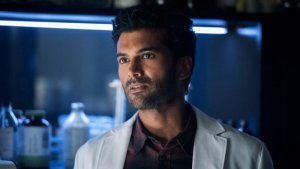There’s a new Halloween episode of CW’s television series “The Flash,” in which the main character Barry Allen, an orphan-turned-detective approaches another character on the show with a serum for curing his cancer. Unfortunately, it actually mirrors some of the fake cancer serums that people are actually falling for.
In the show, Barry’s mom has been killed and his dad wrongly accused of the murder and sentenced to prison. As result, Barry becomes a detective, keeping up with every new scientific advancement and technology in hopes of someday cracking open the mystery about how his mom truly died.

HLH is a rare but potentially fatal condition, in which white blood cells build up in and can damage organs including the spleen, liver and bone marrow, and can damage other white blood cells as well, according to the Dana-Farber Cancer Institute.
It most often affects infants and young children. It impacts certain aspects of the immune system, and may be inherited or caused by a second condition (such as an infection).
Treatment for HLH often includes steroid medication, chemotherapy, immunosuppressant therapy, immunoglobulin (a substance made from human blood plasma that contains antibodies), antibiotics and stem cell transplant.
Alternative therapies for cancer are dangerous
For a lot of people going through cancer, there may be moments when the internet, friends, media, or other sources suggest what are known as "alternative therapies" for treatment. Alternative therapies refer to treatments that people may choose in place of conventional medicine, and they can range from mind-body approaches and diet and nutrition choices to supplements, healing crystals, Chinese medicine, and Ayurvedic medicine. They're touted all over the internet, and they often sound too good to be true.
That's because they probably are, according to Dr. Jason Westin, leader of the diffuse large B-cell lymphoma research team at MD Anderson Cancer Center in the Department of Lymphoma and Myeloma.
Dr. Jason Westin, leader of the diffuse large B-cell lymphoma research team at MD Anderson Cancer Center in the Department of Lymphoma and Myeloma on the importance of avoiding alternative therapies for cancer.
"If there were treatment options that weren't based on chemotherapies or targeted therapies that worked well for our patients, sign me up!" he said. But it’s for a good reason that these therapies aren't used at comprehensive cancer centers: they haven't proven themselves effective in clinical trials, which are rigorous studies that test treatments in the population of people they're intended to treat. Clinical trials test new treatments for safety and efficacy; every drug or treatment approved for widespread use by the U.S. Food and Drug Administration (FDA) has to have gone through multiple phases of clinical trials.
"Many patients wonder, 'are [doctors] hiding a treatment that might be good for us?'" Dr. Westin said, adding that the answer is, "Absolutely not."

Dr. Westin explained that, if there were to be something out there that worked better than the proven treatment options that doctors usually usesuch as chemotherapy or targeted therapiesresearchers would be studying that something in clinical trials.
"And we are studying it," he said. In fact, there are thousands of clinical trials underway studying new and potentially better treatment options.
Sometimes, the therapies or supplements you read about on the internet can be okand maybe even beneficialif they’re used with conventional medicine, not in its place. These options make up “complementary medicine,” which, when its used in tandem with conventional medicine, is called "integrative medicine.” Many doctors believe in integrative medicine, so long as they remain in the loop and give their patients the go-ahead before combining anything new with their treatment.

But the majority of doctors tend to be in agreement about the fact that these options should never replace conventional treatment. In 2018, researchers out of Yale University substantiated this through a study published in JAMA Oncology that found that patients who choose alternative therapies in the place of conventional medicine are twice as likely to die from their cancers. But unfortunately, a survey that same year found that nearly 40 percent of people believe that alternative therapies alonesuch as vitamins, minerals, or dietcan cure cancer.
But even if you weren't planning on foregoing the treatment that your doctor prescribes as you try out something you read on the Internet, it's absolutely vital that you talk to your doctor first. Your oncologistswho know the specifics of your cancer and the way the treatments you're taking workare the only ones who will be able to tell you whether that "cancer-curing" supplement is going to interact negatively with your actual treatment. It may, for instance, cause the treatment to be less effective, or may wind up being harmful, or causing debilitating side effects.

That's why Dr. Westin is adamant: "Make sure if you're finding information the internet about something that sounds too good to be true, talk to your doctor about it," he said, adding that, in addition to not being effective, these therapies can often cost a lot of money.
Learn more about SurvivorNet's rigorous medical review process.

